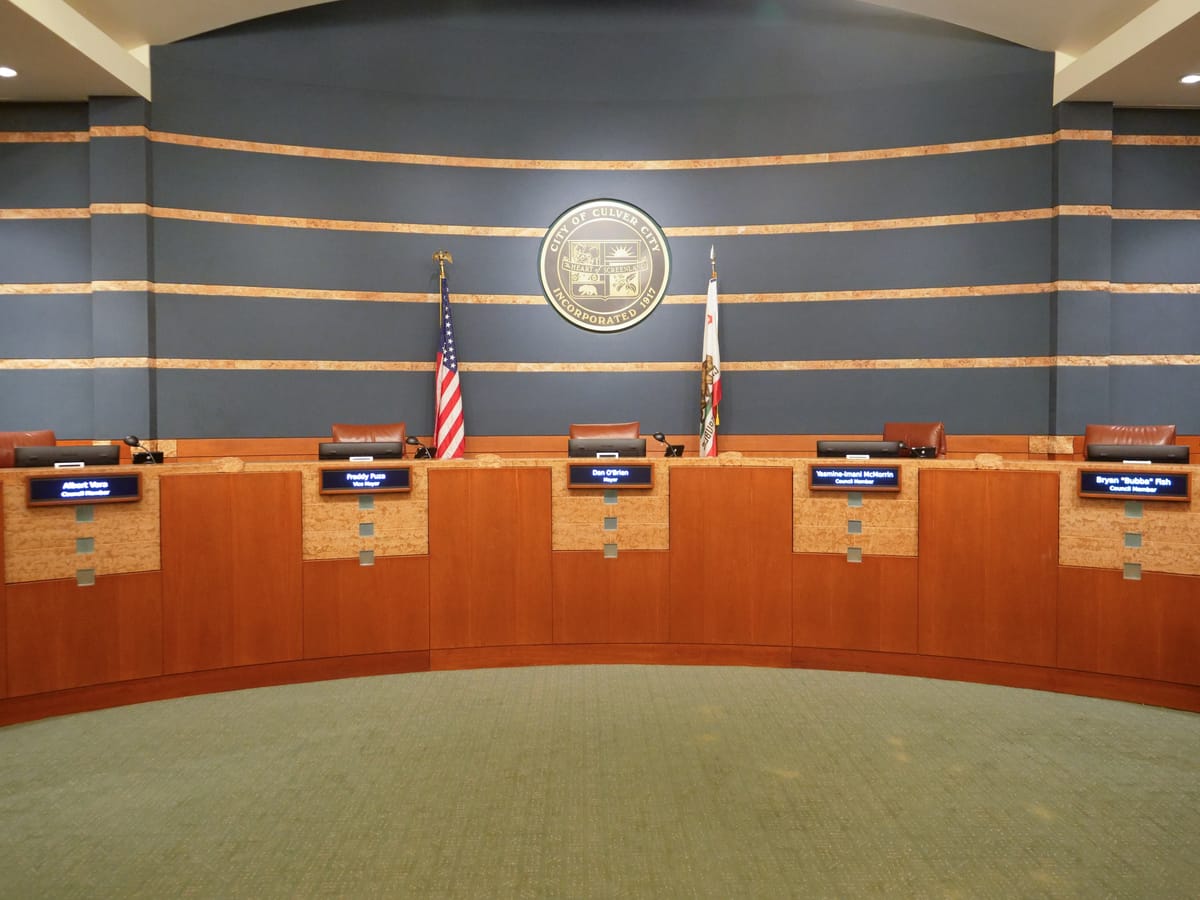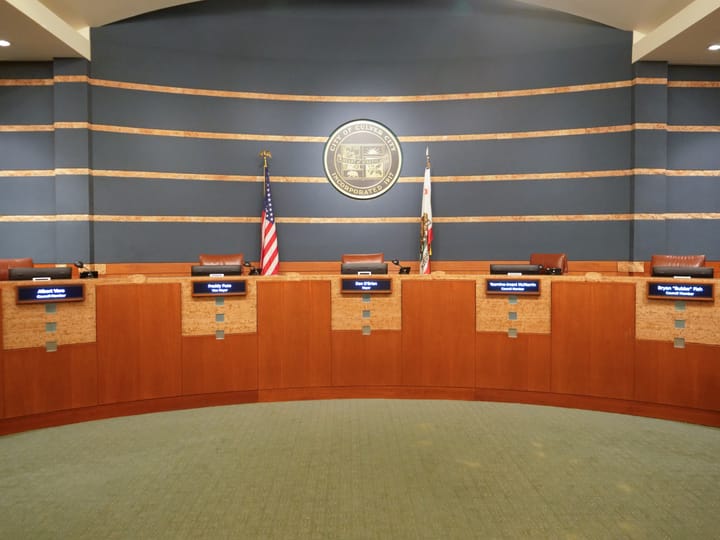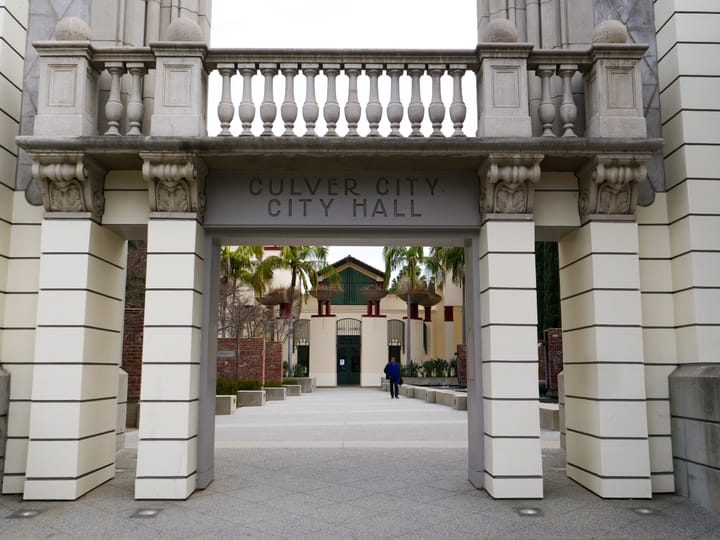Restrictions imposed on use of potential pollutants in Culver City
The Council voted Monday night to impose varying limitations on the use of single-use plastic bags and bottles, balloons, and outdoor smoking in Culver City.

The Culver City Council voted to increase restrictions on several products seen as detrimental to the environment at Monday's City Council meeting. These items — single-use plastic bags and bottles, balloons, and outdoor smoking — were recommended by the Ballona Creek Renaissance as a means to continue their work to improve the environmental conditions of Ballona Creek and Culver City.
While the council eventually decided to move forward with increased restrictions on pollutants recommended by Ballona Creek Renaissance, they also chose to continue considering a potential ban on artificial turf recommended by Culver City's Sustainability Subcommittee.
Single-Use Plastic Carry-Out Bags
The council voted to prohibit the distribution of plastic bags by Culver City businesses, but elected to allow those who bring their own plastic bags to continue using them.
With Councilmember Albert Vera abstaining due to his ownership of Sorrento's Italian Market and their use of these bags in their business practices, concerns about bag restrictions arose regarding the health of small businesses.
Mayor Dan O'Brien expressed concern about businesses suffering through a "death by a thousand paper cuts" and wanted to ensure that they would be well equipped with a more extended phase-in period of two years instead of one.
"It's just yet another thing, and they have been hit time and time again with a new cost," O'Brien said.
As part of the item, the city collected survey results from more than 1,000 respondents from a pool of Culver City residents and businesses. 83% of the 39 retailers surveyed said that a single-use bag ban would negatively impact their business, with the increased cost of alternatives serving as the main issue.
Some restaurants also showed concern about the effectiveness of non-plastic bags in containing liquids or grease. To allow restaurants and other retailers time to find effective alternatives to plastic bags, the council agreed upon an 18-month phase-in period, and hardship waivers will be available.
Even if Culver City did not act, Senate Bill 1053 would impact plastic bag usage starting January 1, 2026. It closes the loophole that allowed certain stores to offer thicker plastic bags as "reusable," avoiding the state's plastic bag ban implemented initially in 2014.
The motion related to plastic bags passed 4-0, with Vera abstaining from the vote.
Single-Use Plastic Bottles
A more conservative approach was taken regarding bottles, building on an already implemented ban on the use or distribution of bottled water at city facilities and sponsored events. The council moved to expand that ban to any single-use plastic bottles, regardless of liquid.
Implementing an additional fee to purchase single-use bottles was an option recommended by the Sustainability Subcommittee to "offset the cost of climate initiatives in the City." Questions remained over the legality of such a fee and the ability to avoid classifying it as a tax, so direction was given to city staff to continue exploring the feasibility of that fee instead of implementing it outright Monday night.
Having transitioned away from single-use bottles in the past, Vera was able to participate in discussions about potential restrictions on them. He argued that it should be up to business owners to make the decision whether or not to sell plastic bottles themselves.
"I know the cost difference and the profit margin of transitioning," Vera said. "To say across the board that we are going to ban the use of single-use bottles in all of our retail stores is not showing me that we want to value or support businesses."
But Vice Mayor Puza noted that these efforts are about understanding and balancing the needs of businesses with the needs and health of the community. He pointed out that water bottles are exempt from sales tax as a grocery item, minimizing the impact restrictions would have on city revenues.
"I want to challenge the myth that you can't be business friendly and care about the environment at the same time," Puza said of the recommendation. "I don't think those are mutually exclusive."
The vote to expand the current restrictions passed unanimously.
Balloons
While the council voted to ban the use of balloons in Culver City's public spaces, concerns about enforcement drove some council members away from the idea.
"Are we going to call the balloon police?" Vera wondered.
Vera was also concerned about the economic impact on businesses and suggested conducting an Economic Impact study before the council made decisions. Of the seven businesses surveyed on the potential balloon ban, 33% attributed 10-20% of their earnings to balloons, while alternatives to balloons account for less than 5% of the business of all seven retailers.
Demonstrating a particular concern for the negative impacts of lost balloons on the environment, Councilmember Bubba Fish expressed that he would have preferred an even more aggressive approach against balloon use in Culver City.
A 2019 study conducted in Australia and New Zealand on the connection between seabird mortality and the ingestion of marine debris found that soft plastics, such as the latex used in most balloons, were 14 times more likely to cause death than hard plastics.
"Soft plastic packaging, balloon fragments, rubbers and synthetic foams together accounted for only 5.4% of items but were responsible for 42% of probable and known mortalities," the study reads.
But it was the release of balloons that caused environmental impacts, O'Brien argued, and he suggested banning the release of all balloons in the city. However, he did not want to support a complete ban on their use in public spaces for reasons similar to Vera's.
The motion to ban the use of balloons in Culver City public spaces passed 3-2, with Vera and O'Brien dissenting.
Outdoor Smoking
Vice Mayor Freddy Puza likened the move to ban outdoor smoking entirely to attempts to ban alcohol in the United States during the 1920s and early 1930s, a period known today as Prohibition.
"I just don't think that's going to work because I personally don't think you can do that," Puza said.
Instead, the council voted to create smoking zones where users could find respite while banning outdoor smoking outside of these zones. Staff would defer to the council to determine zones where smoking is permitted. The option to expand the areas in the city where smoking is prohibited will also be considered, with the choice based on which is easier for staff to implement and enforce.
This time, it was Mayor Dan O'Brien who advocated for even stronger policies from the city. He admitted his strong distaste for cigarette smoke and was not sure where he would be happy with these zones.
"I wouldn't want a smoking zone near anything," O'Brien said
But Councilmember Yasmine-Imani McMorrin argued that these zones are informally being created through congregations of people who find places to smoke when their own spaces have smoking bans attached to them.
"[Multi-Family units] already have quasi-smoking zones because folks are not supposed to smoke inside their unit," McMorrin said. "Folks find places outside of their units to congregate or go for a walk."
She argued that the goal of this regulation was not to criminalize the act of smoking, but to encourage people to conduct themselves in a way that is healthiest for the city.
O'Brien and Vera also raised similar concerns about enforcement, with O'Brien arguing that the policy paves the way for selective enforcement and that this direction was not "practical."
The motion to adopt a ban on outdoor smoking outside of Culver City outside of designated smoking zones passed 3-2 with dissent from O'Brien and Vera.
Artificial Turf
Environmental and health impacts associated with artificial turf led the Sustainability Subcommittee to discuss including a potential ban alongside the items suggested by Ballona Creek Renaissance.
Concerns about the runoff of crumb rubber and the high concentrations of perfluoroalkyl and polyfluoroalkyl substances (PFAS) — colloquially known as "forever chemicals" — in artificial turf motivated the discussion.
However, the improvement of technologies related to artificial turf, including the availability of PFAS-free artificial turf, was enough for the council to reconsider a ban outright. The item was sent back to the Sustainability Subcommittee for further review.




Comments ()